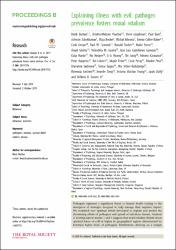Please use this identifier to cite or link to this item:
https://hdl.handle.net/20.500.11779/1245| Title: | Explaining Illness With Evil: Pathogen Prevalence Fosters Moral Vitalism | Authors: | Sachkova, Marianna Kuppens, Peter Crespo, Carla Bain, Paul Leknes, Siri Tong, Jennifer Fischer, Ronald Eastwick, Paul W Pelay, Cesar M. Guerra, Valeschka Guevara, José Luis Castellanos Pina, Afroditi Swann, William B Yeung, Victoria Wai-lan Hooper, Nic Karasawa, Minoru Vauclair, Christin-Melanie Ashokkumar, Ashwini Friese, Malte Huang, Li-Li Saguy, Tamar Silfver-Kuhalampi, Mia Loughnan, Steve Bastian, Brock Becker, Maja Duffy, Jacob Bilewicz, Michał Sortheix, Florencia Collier-Baker, Emma Hanke, Katja Peker, Müjde Gómez, Ángel Junqi, Shi |
Keywords: | Spiritual belief Vitalism Pathogens Disease Morality |
Publisher: | Proceedings of the Royal Society B: Biological Sciences | Source: | Bastian, B., Vauclair, CM., Loughnan, S., Bain, P., Ashokkumar, A., Becker, M., ... Swann, WB. (November 06, 2019). Explaining illness with evil: pathogen prevalence fosters moral vitalism. Proceedings of the Royal Society B: Biological Sciences, 286, 1914, 20191576. DOI : https://doi.org/10.1098/rspb.2019.1576 | Abstract: | Pathogens represent a significant threat to human health leading to the emergence of strategies designed to help manage their negative impact. We examined how spiritual beliefs developed to explain and predict the devastating effects of pathogens and spread of infectious disease. Analysis of existing data in studies 1 and 2 suggests that moral vitalism (beliefs about spiritual forces of evil) is higher in geographical regions characterized by historical higher levels of pathogens. Furthermore, drawing on a sample of 3140 participants from 28 countries in study 3, we found that historical higher levels of pathogens were associated with stronger endorsement of moral vitalistic beliefs. Furthermore, endorsement of moral vitalistic beliefs statistically mediated the previously reported relationship between pathogen prevalence and conservative ideologies, suggesting these beliefs reinforce behavioural strategies which function to prevent infection. We conclude that moral vitalism may be adaptive: by emphasizing concerns over contagion, it provided an explanatory model that enabled human groups to reduce rates of contagious disease. | URI: | https://doi.org/10.1098/rspb.2019.1576 https://hdl.handle.net/20.500.11779/1245 |
ISSN: | 1471-2954 0962-8452 |
| Appears in Collections: | Psikoloji Bölümü Koleksiyonu PubMed İndeksli Yayınlar Koleksiyonu / PubMed Indexed Publications Collection Scopus İndeksli Yayınlar Koleksiyonu / Scopus Indexed Publications Collection WoS İndeksli Yayınlar Koleksiyonu / WoS Indexed Publications Collection |
Files in This Item:
| File | Description | Size | Format | |
|---|---|---|---|---|
| 10.1098@rspb.2019.1576.pdf | Yayıncı Sürümü - Makale | 459.4 kB | Adobe PDF |  View/Open |
CORE Recommender
SCOPUSTM
Citations
15
checked on Jan 18, 2025
WEB OF SCIENCETM
Citations
11
checked on Jan 18, 2025
Page view(s)
62
checked on Jan 13, 2025
Download(s)
24
checked on Jan 13, 2025
Google ScholarTM
Check
Altmetric
Items in GCRIS Repository are protected by copyright, with all rights reserved, unless otherwise indicated.